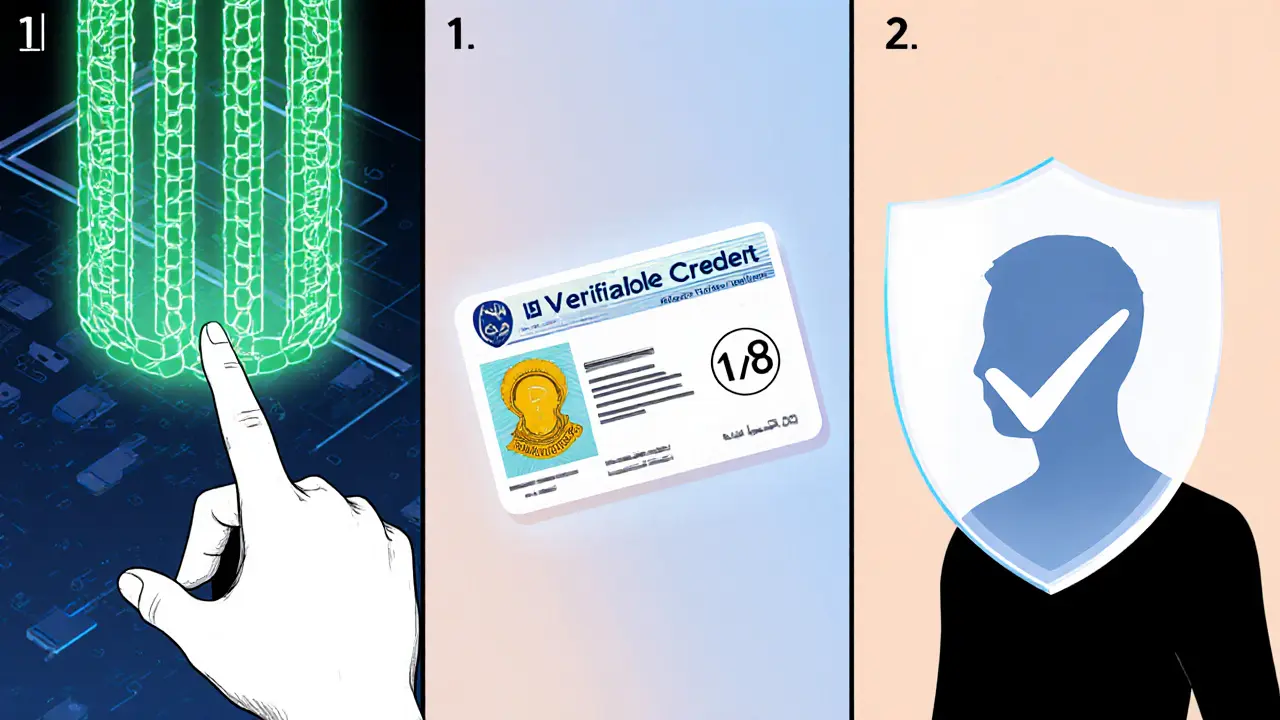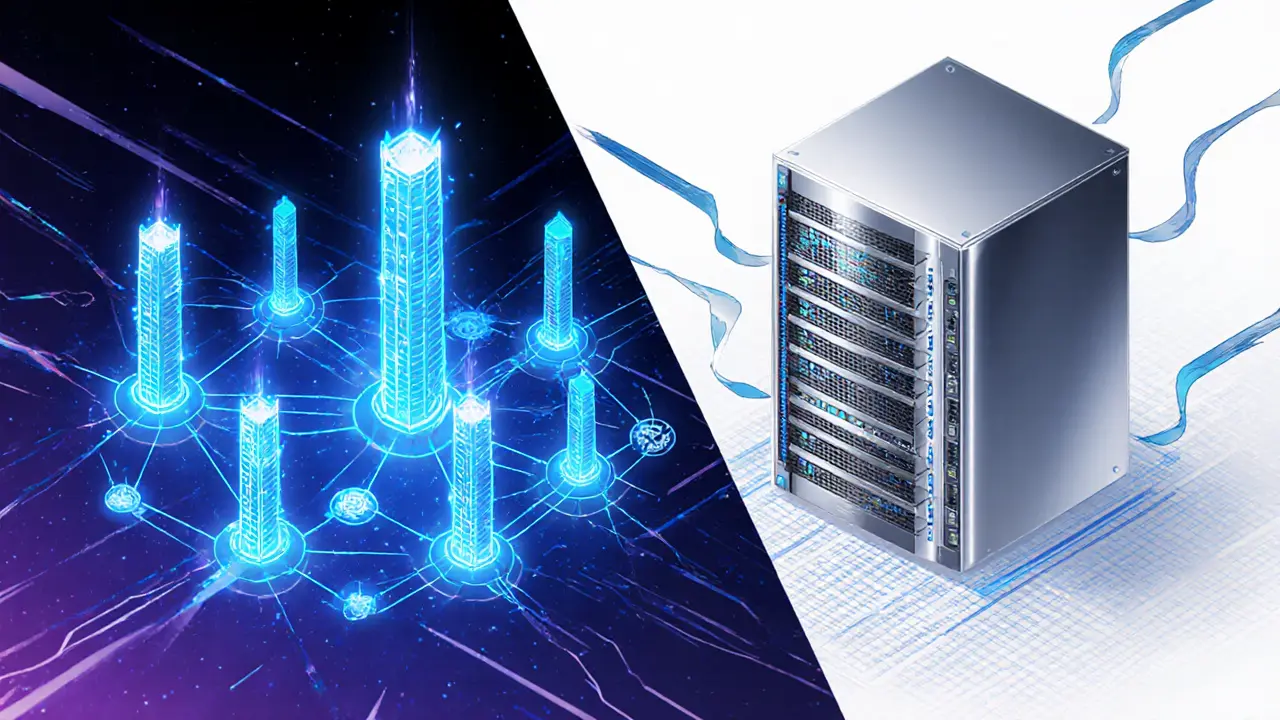Decentralized Identity Benefits Calculator
Decentralized Identity
User-controlled digital identity with enhanced privacy, security, and interoperability.
Centralized Identity
Traditional model where identity data is stored and managed by a central authority.
| Benefit | Decentralized Identity | Centralized Identity |
|---|---|---|
| Data Ownership | User-controlled | Provider-controlled |
| Exposure to Breach | Low – no single database | High – large targets |
| Cross-platform Reuse | Seamless via verifiable credentials | Often requires new accounts |
| Compliance Effort | Simpler – data stays off-site | Complex – heavy storage obligations |
| Infrastructure Cost | Reduced – no central DB | High – maintenance and security |
Rate your current identity system based on these factors:
Your Privacy Score:
- Decentralized Identifiers (DIDs) are globally unique strings stored on a blockchain
- Verifiable Credentials can be cryptographically verified without contacting the issuer
- Zero-Knowledge Proofs allow proving facts without revealing underlying data
- The digital wallet stores private keys for identity access
- W3C standards ensure interoperability across platforms
Every time a data breach hits the headlines, you wonder why we keep handing our personal details to huge tech companies and banks. Imagine a world where you keep full control of your own identity data, share only what’s needed, and never store a massive database of personal info that hackers love to target. That’s the promise of decentralized identity.
What Is Decentralized Identity?
Decentralized Identity is a user‑controlled digital identity model that removes the need for a single, trusted authority. Instead of a central server holding your name, address, and credentials, the data lives in a distributed ledger and in the user’s own digital wallet.
Core Components of the Ecosystem
Three building blocks make the system work together:
- Decentralized Identifier (DID) is a globally unique string that points to a set of public keys and service endpoints stored on a blockchain or other distributed ledger.
- Verifiable Credential is a tamper‑evident digital attestation (like a driver’s license or university degree) that can be cryptographically verified without contacting the issuer.
- Zero‑Knowledge Proof (ZKP) lets you prove something about your data - for example, that you are over 18 - without revealing the underlying information.
A Digital Wallet on your phone stores the private keys that unlock your DIDs and credentials, acting as the personal vault for your identity.

Key Benefits Over Traditional Systems
Organizations and users alike enjoy a range of advantages:
- Privacy & Control: Users decide exactly which attributes to share and with whom, fulfilling data‑minimization principles.
- Security: Credentials are cryptographically signed and stored off‑site, so a breach at one service does not expose the whole identity.
- Interoperability: Built on open W3C standards, DIDs work across browsers, mobile apps, and IoT devices.
- Cost Reduction: Companies no longer need to maintain costly identity databases or pay third‑party providers.
- User Experience: One verified credential can be reused on many platforms, eliminating repetitive form‑filling.
- Regulatory Alignment: Because personal data stays with the user, compliance with GDPR, CPRA, and emerging privacy laws becomes simpler.
Decentralized vs. Centralized Identity - A Quick Comparison
| Benefit | Decentralized Identity | Centralized Identity |
|---|---|---|
| Data ownership | User‑controlled | Provider‑controlled |
| Exposure to breach | Low - no single database | High - large targets |
| Cross‑platform reuse | Seamless via verifiable credentials | Often requires new accounts |
| Compliance effort | Simpler - data stays off‑site | Complex - heavy storage obligations |
| Cost of infrastructure | Reduced - no central DB | High - maintenance and security |
Real‑World Impact
Early adopters such as government e‑services, fintech startups, and large enterprises report measurable gains. A European airline reduced onboarding time by 40% after issuing verifiable boarding passes as credentials. A North‑American health‑tech firm cut compliance audit costs by 30% because patient records remained in patients’ wallets, not in the company’s servers.
Beyond efficiency, fraud rates drop dramatically. Since credentials are tied to cryptographic keys owned by the user, identity theft becomes far harder than stealing a static username‑password pair.

Implementation Considerations for Organizations
Adopting the technology isn’t a plug‑and‑play switch, but the steps are clear:
- Assess existing authentication flow and identify touchpoints where DIDs can replace passwords or social logins.
- Select a standards‑compliant DID method (e.g., Ethereum, Hyperledger Indy).
- Integrate a verifiable‑credential issuance service - many cloud providers now offer API‑first solutions.
- Develop or adopt a mobile digital‑wallet SDK to let users store and present credentials.
- Run user‑education campaigns: explain key management, backup recovery, and how zero‑knowledge proofs protect privacy.
- Monitor compliance with data‑privacy regulations; notice how GDPR aligns naturally with self‑sovereign data handling.
Challenges remain - users must safeguard their private keys, and organizations need to support recovery mechanisms without re‑centralizing data. Offering hardware‑wallet options or custodial recovery services can bridge the gap for less‑tech‑savvy customers.
Future Outlook
Regulators worldwide are tightening privacy rules, and enterprises are feeling the pressure to reduce liability. Analysts predict that by 2027, at least 25% of large‑scale B2C platforms will have a decentralized‑identity layer. Advances in zero‑knowledge proof efficiency will make real‑time age‑verification, credit‑scoring, and even medical‑record sharing possible without ever exposing raw data.
The technology is still maturing, but the trajectory is clear: as user awareness grows, the incentive to keep personal data out of corporate silos will push broader adoption across finance, healthcare, travel, and even education.
Frequently Asked Questions
How does a decentralized identity differ from a social‑login (e.g., "Login with Google")?
Social logins rely on a central provider that stores your credentials and can see every site you log into. A decentralized identity stores your proof in a personal wallet, and the provider never learns which services you access.
What happens if I lose my phone or private key?
Most wallet solutions support a recovery phrase (12‑24 words) that you can store securely offline. With the phrase you can rebuild the wallet on a new device. Some providers also offer custodial backup services while still keeping the user in control.
Are decentralized identities compatible with existing systems?
Yes. Because DIDs and verifiable credentials follow open W3C standards, they can be integrated via APIs, SDKs, or middleware that translate between legacy authentication methods and the new model.
Do I need to understand cryptography to use decentralized identity?
Not really. The wallet apps handle key generation and signing behind the scenes. Users only need to follow simple steps: set up a wallet, back up the recovery phrase, and approve sharing requests.
Will adopting decentralized identity help my organization meet GDPR?
Because personal data never resides in the organization’s databases, the burden of protecting that data is reduced. The organization only needs to verify signatures, which aligns with GDPR’s data‑minimization and storage‑limitation principles.








Shaian Rawlins
November 25, 2024 AT 14:34I've been following the decentralized identity conversation for a while now, and it's refreshing to see a technology that actually puts the user first. The idea of owning your own identifiers without a big corporation in the middle feels like a win for privacy. Plus, the ability to reuse verifiable credentials across platforms could save us all a lot of time. I can imagine a future where we no longer need to fill out endless forms for every new service. It's a great step toward a more open and secure digital world.
Katherine Sparks
November 29, 2024 AT 01:54Dear community, I wholeheartedly endorse the shift toward self‑sovereign authentication, as it aligns with the principles of autonomy and data minimisation. The reduction in breach surface is a compelling argument for enterprises seeking to mitigate risk.
Moreover, the interoperability afforded by open standards promises a smoother user experience across diverse ecosystems. 😊 Please consider the long‑term regulatory benefits as well, particularly in the context of GDPR compliance. I remain optimistic about widespread adoption, despite the occasional implementation challenges.
Jim Griffiths
December 2, 2024 AT 13:14Decentralized IDs cut out the middleman, saving both cost and security headaches.
Miranda Co
December 6, 2024 AT 00:34Look, if you still trust a big company with your data, you're basically handing them the keys to your house. Decentralized identity actually forces you to take responsibility, which is something most people are too scared to do. Stop being lazy and get a wallet, it's not rocket science.
Promise Usoh
December 9, 2024 AT 11:54From a philosophical standpoint, the advent of decentralized identity represents a paradigm shift in the ontology of digital personhood. It challenges the hegemony of centralized data silos and redefines trust through cryptographic proof. While the technology is still nascent, its potential to democratise access to services is signifcant.
Taylor Gibbs
December 12, 2024 AT 23:14Hey folks, just wanted to say that diving into self‑sovereign identity can feel like wading into a deep pool, but it's totally worth it. The wallet apps are getting way more user‑friendly, and you don't have to be a tech guru to set them up. Plus, think about all the hassle you avoid when you don't have to fill out the same form over and over. Keep an eye on the community resources – they'll guide you through the key backup stuff. It's all about taking control of your digital self.
Rob Watts
December 16, 2024 AT 10:34I've been watching the rise of decentralized identity and honestly it's a game changer for the internet I think the biggest win is that users finally get to own their data and not be at the mercy of big data silos I remember when I had to reset passwords for every single site and how insecure that made me now with verifiable credentials you can prove who you are without spilling all your personal details it cuts down the attack surface dramatically and that alone should make any security team sit up and take notice the interoperability aspect is also huge because once you have a wallet you can walk into different services and just present the needed proof without re‑registering again it streamlines the user journey and cuts down friction for businesses too eventually we’ll see a shift in how regulations are enforced because compliance becomes simpler when the data never leaves the user’s device and auditors can just verify signatures instead of digging through massive databases sure there are challenges like key recovery and user education but those are solvable problems the ecosystem is already building backup solutions and user‑friendly interfaces and as the network effect grows more people will adopt it leading to network security improvements overall I’m excited to see where this goes and I encourage anyone skeptical to try a wallet for a week and see the difference yourself
Bhagwat Sen
December 19, 2024 AT 21:54Yo, you know what's even cooler? Using DID to prove you're over 21 without ever showing your ID. Imagine hitting a bar and just flashing a cryptographic proof-no more flashing that ridiculous plastic card. It's all about convenience and privacy, plus it looks super futuristic, right?
Cathy Ruff
December 23, 2024 AT 09:14Honestly this whole decentralized hype is just another fad waiting to crash.
Amy Harrison
December 26, 2024 AT 20:34Don't let the noise get you down! 🙌 Decentralized identity is still early, but the community is building solid tools every day. Keep testing and share your wins – the more we talk about it, the stronger it gets! 😄
mukesh chy
December 30, 2024 AT 07:54Oh sure, throw away all centralized services because a handful of open‑source wallets will magically fix every security nightmare. Reality check: most users can't even manage a password manager, let alone a private key.
Marc Addington
January 2, 2025 AT 19:14Our nation shouldn't hand over its citizens' data to foreign corporations. Decentralized identity lets us keep control at home.
Amal Al.
January 6, 2025 AT 06:34It’s wonderful to see such enthusiasm for self‑sovereign solutions!; the emphasis on user empowerment aligns perfectly with inclusive digital policies; remember to back up your recovery phrase securely; community support can guide you through any hiccups.
Alex Gatti
January 9, 2025 AT 17:54How does the ecosystem handle revocation of credentials if a key gets compromised
stephanie lauman
January 13, 2025 AT 05:14From a security analysis perspective, the claim that decentralized identity eliminates all breach vectors is overly optimistic. While the attack surface is reduced, threat actors can still target wallet software and social engineering attacks remain viable. 😊 Therefore, a comprehensive risk assessment must consider both cryptographic safeguards and user behavior.
Natalie Rawley
January 16, 2025 AT 16:34OMG can you even imagine a world where you don't have to remember a gazillion passwords? It's like living in a sci‑fi movie and I'm totally here for it!!!
Eva Lee
January 20, 2025 AT 03:54The implementation of verifiable credential schemas within a decentralized identifier (DID) framework necessitates a robust ontological alignment to ensure semantic interoperability across heterogeneous data silos.
Patrick MANCLIÈRE
January 23, 2025 AT 15:14For anyone looking to integrate DIDs into their stack, start by choosing a well‑documented method like did:ethr and leverage existing SDKs. This will smooth out the onboarding process and reduce boilerplate code.
Ciaran Byrne
January 27, 2025 AT 02:34Always provide a clear recovery path for users.
Greer Pitts
January 30, 2025 AT 13:54Hey there! I totally get that setting up a wallet can be intimidating at first, but once you get the hang of it, it's super empowering. If you need any help, just shout out-happy to walk you through.
Lurline Wiese
February 3, 2025 AT 01:14Okay, so I tried the new SSI demo and honestly, it felt like the future but also gave me major FOMO because I missed the boat on the first wave.
Jenise Williams-Green
February 6, 2025 AT 12:34We must demand that companies stop exploiting personal data for profit; adopting self‑sovereign identity is not just a tech trend, it's a moral imperative that safeguards human dignity.
Kortney Williams
February 9, 2025 AT 23:54Reflecting on the notion of digital self‑ownership, it seems we are at a crossroads where philosophy meets practical implementation, inviting us to rethink identity itself.
Adarsh Menon
February 13, 2025 AT 11:14Sure, because handing over your private key to a random app is always a brilliant idea
Laurie Kathiari
February 16, 2025 AT 22:34Honestly, the hype train for decentralized identity is steaming ahead, leaving behind those who cling to outdated centralized models-it's time to upgrade or be left in the dust.